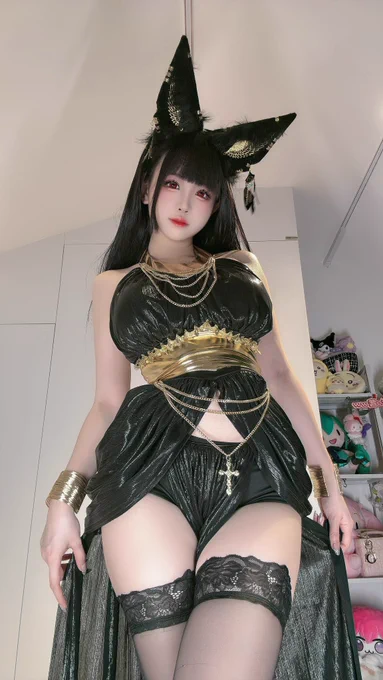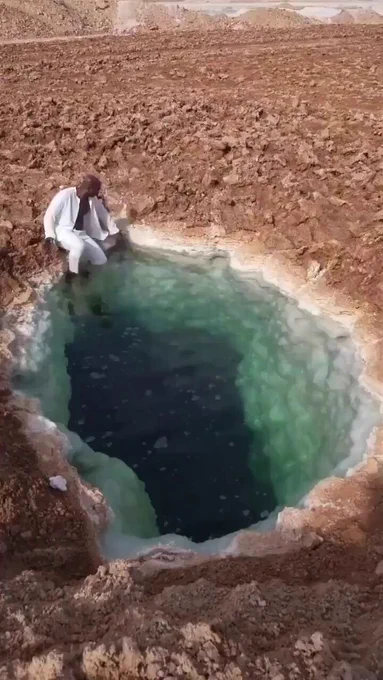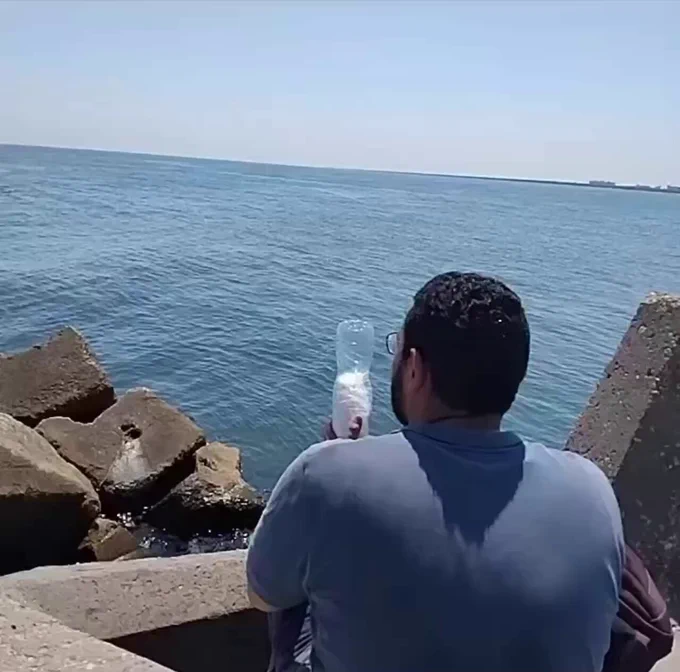Search results for Egypt
People
Not Found
Tweets including Egypt
Egyptian cat🐈⬛ https://t.co/p5upo5fATI

0
0
13
4K
178
#Egypt# and #France# have signed a €7 billion ($7.6 billion) agreement to develop a large-scale green hydrogen and ammonia production complex near Ras Shokeir on the #RedSea# coast https://t.co/6kj58YSkv1
Show more


0
0
0
1
2
After 430 years in Egypt we have finally escaped. Praise the Lord for this gift. #FroshTheoOne#
0
0
0
0
0
2,000-year-old fortress discovered in Egypt’s Sinai Desert reveals military and industrial past from Ptolemaic to Roman eras.
https://t.co/5Gmj0f69z1


0
0
0
0
0
The first vending machine was invented in 1st century CE Egypt to dispense holy water. The next widely known vending machine was invented 1,800 years later in Victorian England.
0
0
1
4
2
There will be complete darkness covering the land of egypt #FroshTheoOne#
0
0
0
0
0
The water in Siwa Oasis, Egypt has such a high concentration of salt that it is impossible to sink in it https://t.co/wCGkEngaYC

0
0
463
19.9K
1.7K
“Forgive us our brothers, there’s nothing we can do.”
- An Egyptian man throws bottles filled with food, hoping they would reach Gaza. https://t.co/Z0RL6o9Ym1

0
0
1.5K
34.4K
7K
You can't sink in the water in Siwa Oasis, Egypt because of the intense salt concentration… https://t.co/lXsK3BB5am

0
0
23
77
8
This is simply superb from @GadSaad in an i/v with @joerogan. He sets out how Islamists will never tire of violent conquest. Egypt was once 100% Coptic Christian, now its 10%, Syria is currently going through ethnic cleansing & Lebanon was once a majority Christian country.
"Islam as an ideology does not tolerate others."
Gad refers to "Dar al-Islam," meaning "House/Abode of Islam," & Dar al-Haram" meaning the "house of war" or "abode of war".
If it is not Islamic, it has to be via war. Hence why Israel is so hated & the victim of violence like 7 October.
Show more

0
0
84
2.1K
476
You refused to let us all go serve the Lord. Therefore locusts may cover the land of Egypt! #FroshTheoOne#
0
0
0
0
0
Muslims living with Hindus = Problem.
Muslims living with Buddhists = Problem.
Muslims living with Christians = Problem.
Muslims living with Jews = Problem.
Muslims living with Sikhs = Problem
Muslims living with Baha’is = Problem.
Muslims living with Shintos = Problem.
Muslims living with Atheists = Problem.
Muslims living with Muslims = Big Problem.
This led to:
They’re not happy in Gaza.
They’re not happy in Egypt.
They’re not happy in Libya.
They’re not happy in Morocco.
They’re not happy in Iran.
They’re not happy in Iraq.
They’re not happy in Yemen.
They’re not happy in Afghanistan.
They’re not happy in Pakistan.
They’re not happy in Syria.
They’re not happy in Lebanon.
They’re not happy in Nigeria.
They’re not happy in Kenya.
They’re not happy in Sudan.
Where are they happy?
They’re happy in Australia.
They’re happy in England.
They’re happy in Belgium.
They’re happy in France.
They’re happy in Italy.
They’re happy in Germany.
They’re happy in Sweden.
They’re happy in the USA and Canada.
They’re happy in Norway and India.
They’re happy in almost every country that is not Islamic.
Whom do they blame? Not Islam. Not their leadership. Not themselves.
They blame the countries they are happy in.
They want to change the countries they’re happy in to be like the countries they came from, where they were unhappy.
Show more
0
0
4.5K
194.5K
41.8K
To achieve Perfection, Give
Matthew 19:21 Jesus told him, "If you want to be perfect, go, sell your possessions and give to the poor, and you will have treasure in heaven. Then come, follow Me."
Man is not perfect because GOD never made them perfect. When GOD transformed Earth in Genesis from being dark, formless and void to what it is today, He never once said that it was perfect. They were good or very good at the most but never perfect. GOD could have made all things on earth like the way He created Satan, 'the seal of perfection, full of wisdom and perfect in beauty'. That means Satan is flawless. He is more beautiful than anyone we have ever seen, and his wisdom is beyond Solomon's. Satan is full of wisdom, which is complete and whole. As for Solomon, his wisdom, as in the book of 1 King, is 'exceedingly deep insight, and understanding beyond measure, like the sand on the seashore'. Even though his wisdom was greater than that of all the men of the East, greater than all the wisdom of Egypt, it is not perfect. Solomon' is nothing compared to Satan.
For whatever His divine reason is, GOD did not give anything on earth the seal of perfection. Hence, this is the sad fate of everyone, like Adam and Eve, who are prone to falling like a house of cards because of their imperfect architecture. Therefore, the saying 'to err is human' is an undeniable truth, as it is man's nature to make errors. With Satan as our tempter, we can understand how easily we can make errors and fall into his trap. He is the seal of perfection while we are not. We are like Humpty Dumpty, who sits on our imperfections and has a great fall. Even all the king's horses and all the king's men couldn't put Humpty together again.
Many do not know the consequences of our imperfections. It is the part of us that makes us fail and sin against GOD. Success will always elude us in everything we do - in relationships, careers, health and wealth. Our imperfection is our weakness, causing us to make mistake after mistake. In contrast, perfection is like our strength, and it is like a fortress, infallible. Since we are made imperfect, we will blunder our way to failure. Therefore, we see failures in systems, policies, people, families, societies and countries. The issues are countless. It is not that we do not do our best, but our best is not good enough because we cannot expect anything good out of imperfections. No matter how careful we are, we will boo-boo here and there, jeopardising our success and especially our relationship with GOD. No matter how we view our disappointments, either due to our unfavourable or uncontrollable circumstances, it is our imperfection that contributes to them. It is our imperfection that leads us to unfavourable circumstances that become uncontrollable.
As much as GOD made us imperfect, He does not want us to dwell in our imperfections from His creation. Our imperfection will cause us much pain and sorrow and distance us from GOD. The Palmist advises us to find our strength in GOD so that we will go from strength to strength and not succumb to imperfection. Jesus asks us, 'Be perfect, as your heavenly Father is perfect'. However, GOD is not leaving us to figure out our problem by ourselves. He told the Apostle Paul, "My strength is made perfect in our weakness." In other words, we can be transformed from imperfection to perfection. We need not hold on to our imperfections as our stigma because we are only human. Only when we are perfect do we not sin against GOD, and can we be like our heavenly Father in heaven, sinless. Therefore, being perfect is not a suggestion or advice but an edict. We must overcome our weaknesses of being imperfect so that we can be blessed in all that we do. However, it is much easier said than done because of what Jesus said, "For apart from Me you can do nothing".
It is not that we can do nothing. What Jesus meant is that we cannot do anything that leads to life, only those that lead to death. That is to fulfil what GOD said to Adam, "for in the day that you eat of it, you will surely die". After the fall of man, the Tree of Life is under the guard of a whirling sword of flame with stationed cherubim. No one can access it till Jesus comes as the way, the truth, and the life. Only through Jesus will we find the way of truth to life. Without Jesus, life, as the opposite of death, will evade us. Therefore, overcoming our imperfection is not by our physical determination but by GOD's spiritual anointing through our walk with Christ as we become the doers of His Word. Only then will the narrow path be revealed so that we can find the way to truth in life.
Jesus nor the Bible mentions much about being perfect, minimising its importance. In the encounter of Jesus with the rich young man, Jesus linked perfection as the criterion for eternal life. Therefore, perfection is more than not making errors or sinning but the standard of eternal life. It is a complex process of transformation to be like Jesus with the ability to fulfil the commandments of the old through Moses and the commandments of the new from Him. Jesus said, "Do not think that I have come to abolish the Law or the Prophets. I have not come to abolish them, but to fulfil them". Jesus came to fulfil the Law, and we must do likewise. If we are any short of the standard, we are not perfect.
Let us elaborate on the story of the rich young man to understand the issues. The Jewish man knew all about GOD's commandments but did not have the answer to eternal life. He was rich, implying he must have been educated and not ignorant, having a deep understanding of the GOD's Word. In doubt, he could ask from his many of his teachers. However, no one probably could give him an answer, so he approached Jesus. His question was not out of ignorance but well founded. The Torah does not have the answer because, in the Old Testament, GOD did not offer anyone eternal life. No one, regardless of who they were or their capabilities, was not qualified for eternal life.
In a larger scheme of things, since the Old Testament does not offer eternal life, this implies that fulfilling the Ten Commandments is not enough to qualify for eternal life. Obedience to GOD's Commandments, as stated in the book of Deuteronomy, only assured anyone of a blessed or abundant life, not an eternal life. Therefore, the young man lived a blessed life of wealth because he honoured GOD with his obedience to the commandments - Do not murder, do not commit adultery, do not steal, do not bear false witness, honour your father and mother, and love your neighbour as yourself.
GOD will never shortchange us because He is fair and just. If fulfilling the commandments is enough, GOD would have offered eternal life to His promises. The Psalmist said, "For the LORD God is a sun and a shield; the LORD gives grace and glory; He withholds no good thing from those who walk with integrity." Walking in obedience to His commandments is synonymous with walking with integrity before GOD. Therefore, He would not withhold the good thing of eternal life to those who honour Him. If He did withhold, it must be that eternal life requires more than obedience to the Law. It requires perfection because Heaven is not a place for imperfect sinners who trespass the Law. If we do trespass against GOD, we will be a repeat of Satan, being cast out of heaven. Therefore, perfection is a must to be in heaven.
Jesus came as the new order that is above the old to amalgamate the Old and the New as one so that we could, through Him, not only have a blessed life but also eternal life. The young man was standing at the point of inflexion between the Old Testament and the New Testament, where Jesus was the point of change. Therefore, Jesus could take his question because He is the answer. To understand the need for new order of Jesus is that the Old, through its Law, is to expose sinfulness and highlight the need for divine grace. The Law cannot save us from eternal death. Eternal life must be through Jesus Christ and nothing else, and without Him, there can be no eternal life. Therefore, Jesus has to come with the new order.
If we were to go strictly by the rules to obtain eternal life, we need to abide by the old and new commandments. When the young man asked Jesus, Jesus did not supersede the old commandments or undermine them, even when He came as the crusader of grace, the new order, and not the Law, the old order. Therefore, many have misunderstood the scripture when they say they are not under the Law but under grace. If we are no longer under Law, then why would Jesus say to the young man, "If you want to enter life, keep the commandments"? Jesus should have said, "If you want to enter life, believe in Me". Unfortunately, He did not, but that is the thinking of many. They misinterpreted the epistle of Romans, 'For sin shall not be your master, because you are not under law, but under grace.' Only when we no longer sin will sin not be our master. Then, we are not under the Law but under grace. If we persist in sin, we will still be under the Law, and grace has no favour to us. We must read the Bible like reading a legal contract, not in isolation but in totality. We cannot lift, cut, paste, or arrange the sentence as we wish to make it palatable.
Jesus was impartial and upheld the Law even with His disciples. They were not under grace because they were His disciples. Their wrongdoings were judged under the Law. For that, we can look at the difference between Peter and Judas Iscariot. Both betrayed the Son of GOD, but one was restored, and the other was not because one wrongdoing did not trespass the Law while the other did. Peter's wrongdoing was that he denied Jesus, but he did not trespass the Law to murder, commit adultery, steal, or bear false witness. He did not do Jesus any harm by walking away and denying Him. Judas indirectly murdered Jesus by going to the chief priests and agreeing to hand over Jesus in exchange for thirty pieces of silver. Judas' love for money is not a sin, but his love for money caused him to betray innocent blood. That is a sin. If grace can override the Law, and under grace, GOD takes no account of our wrong, then Judas should not be sickened with guilt but be overcome with love and forgiveness. Sad to say, the love and forgiveness did not come to fill his guilty conscience, and he was so filled with self-condemnation that he killed himself. Therefore, no one is above the Law, not even Jesus' disciples.
The rich young man is a better man than Judas, but his fate is no different. He was a visionary of spiritual foresight. No one, not even the Pharisees or the scribes, questioned Jesus about the way to eternal life except him. He had self-discipline and control, not letting his desires control his obedience to the commandments. He indeed had a highly commendable personality. The Epistle of Mark commented that Jesus looked at him and loved him. He clearly met with Jesus' approval. He fulfilled the conditions of the Old Testament, so Jesus offered him the new requirement of the New Testament. Instead of having a to-do list of 'thou shall do this' and 'thou shall not do that' as tests of his obedience, he must give. His ability to give will make him like GOD, perfect. For that, he must give his possessions to the poor and give his life to GOD by following Jesus in total surrender. Only by following Jesus and exemplifying His way will he be made perfect. Jesus is perfect, and following Him would mean we walk the way of perfection.
Unfortunately, despite his endeavour to keep all the commandments and be a better person, the rich young man did not get what he wanted: eternal life. He did not obtain eternal life, not because he was rich but because of his unwillingness to give. Jesus said to His disciples, "Truly I tell you, it is hard for a rich man to enter the kingdom of heaven. Again, I tell you, it is easier for a camel to pass through the eye of a needle than for a rich man to enter the kingdom of God." Jesus used an exaggerated figure of speech to emphasise that it is beyond any doubt that a rich man will enter the kingdom of heaven. The issue is not with the wealth but the unwillingness to give. In retrospect, no one will remain wealthy if they keep giving away their wealth. Therefore, Jesus has nothing against rich people but people who are unwilling to give and only live to enrich themselves.
If we are like the rich young man who is not contented by just life on earth, we also desire eternal life; we must do more than the young man. We must be like Peter, who said, "We have left everything to follow You". Then Jesus will reply to us saying, "Truly I tell you, in the renewal of all things when the Son of Man sits on His glorious throne, you who have followed Me will also sit on twelve thrones, judging the twelve tribes of Israel. And everyone who has left houses or brothers or sisters or father or mother or wife or children or fields for the sake of My name will receive a hundredfold and will inherit eternal life. Let us not let our unwillingness to give forfeit our eternal life. Therefore, be the transformation we want to see in ourselves, give.
Show more

0
0
0
2
0
Know Thy Enemy
1 Peter 5:8 Be sober-minded and alert. Your adversary, the devil, prowls around like a roaring lion, seeking someone to devour.
Sun Tzu, a Chinese military general, strategist, and philosopher, once said, "Know thy enemy and know yourself; in a hundred battles, you will never be defeated." Knowing ourselves alone is like a blind archer shooting arrows at a target, hoping one will hit the bullseye. Knowing ourselves and our enemy is like an archer with eagle-eye vision, and with every arrow he shoots, he will surely hit the bullseye. Therefore, we cannot walk naively through life, blind to our enemy, knowing nothing of him except his name. Ignorance is not bliss. In the book of Hosea, GOD said, "My people are destroyed for lack of knowledge. Because you have rejected knowledge, I will also reject you as My priests. Since you have forgotten the law of your God, I will also forget your children."
Who is our enemy? Anything or anyone that turns us away from GOD is our enemy. Therefore, as children of GOD, we cannot be as innocent as doves but also as wise as serpents to know who our enemy is. We cannot be like Eve, knowing good and not evil or knowing light and not darkness. She is not at fault because she has not taken the fruit of the tree of the knowledge of good and evil during that time to know the existence of evil. She only knew a friend but not a foe, good but not evil, that could turn her fate for the worse. Hence, she was as innocent as doves. We cannot be like that because within us is the knowledge of good and evil, so we must be more than innocent as doves but as wise as serpents to know the traps of evil. We cannot be living in a fool's paradise, thinking that GOD will save us from the hand of the devourer. He will not since He did not save Adam and Eve from the deceit of the Serpent that led them into suffering, pain and death. Why would he make an exception for us?
To beware of our enemy, we should never let anyone sweet-talk us into believing anything that seems too good to be true—it probably is. GOD's actions speak louder than His Words. Unless those gifts are under goodwill, everything of GOD, protection, provision, blessings, or promises requires us to walk on the tightrope of obedience. Even though Eve is ignorant, naive, or impressionable, she could not have fallen into the Serpent's lie if she had walked tightly on the rope of obedience. God's protection and provision are only found in obedience, and anything out of obedience is out of His protection. Hence, once Adam and Eve disobeyed, they had to leave Eden away from GOD's protection and provision. GOD did not show them leniency even when they were first-time offenders deserving a second chance.
Once fallen, the second chance only came a few thousand years later in the form of Jesus Christ. Even if we are given a second chance, it does not exempt us from being disobedient to do as we wish. We still have to be obedient in the face of temptations. Even if Jesus's love covers all sins, it does not mean we can continue sinning. Anyone who continues to sin shows he is unrepentant. Forgiveness requires a repentance heart and demands us to turn over a new leaf. If there is no change and transformation, it will mean that there is no repentance. In the epistle of 1 John, John states, "No one who remains in Him keeps on sinning. No one who continues to sin has seen Him or known Him." That implies that knowing GOD will teach us to stop sinning, which is where forgiveness comes in. If we keep sinning, then we need more than forgiveness; we need tolerance. But GOD is willing only to forgive sin, not tolerate sin.
Coming back to what is written in the book of Hosea, we are destroyed by a lack of knowledge because we have rejected knowledge. At face value, we are blockheaded to reject knowledge, but in reality, our fallen nature refuses to accept the things of GOD. It is written in the Epistle of Galatians, 'For the flesh craves what is contrary to the Spirit, and the Spirit what is contrary to the flesh. They are opposed to each other, so you do not do what you want.'
Therefore, no matter how hard we endeavour, as long as our flesh is alive, we will refuse to learn. It is not that we do not want to, but we cannot because the flesh, our gatekeeper, has a natural rejection of the law. The law of GOD goes in one ear and out the other. Metaphorically, we are like a filter that absorbs all evil influences and sieves out all good. Through the prophet Hosea, GOD reprimanded the Jews for being blockheaded, but it is not a Jewish problem but a universal one. Anyone who wants to become a child of GOD will face the issue of incompatibility of their fallen nature with GOD's. They are like oil and water, immiscible. Indirectly, GOD is saying through the prophet Hosea that whoever rejects the law is incompatible with Him and cannot be His children. Therefore, anyone holding on to his flesh becomes an enemy of GOD and cannot be his child.
In today's context, many believe that once their sins are forgiven, it means that God has accepted them as who they are—fallen beings. Do not be deceived. If this is true, then many things cannot add up. If the blood of Jesus can wash away our sins and transform our fallen nature, then Jesus would not ask us to deny ourselves, take up our cross, and follow Him. Jesus's blood can only wash away our sins but not transform our fallen nature. When Jesus said, "It is finished." And bowing His head, He yielded up His Spirit. It does not mean that, with His death, we are free from our fallen nature. Our enemy hopes we will believe that. Jesus meant He had finished his mission on earth. He conquered man's eternal death so that whoever believes in Him will not perish but have everlasting life. If Jesus's death is enough to put to death our fallen nature, then it is redundant for Jesus to ask us to deny ourselves. That is to say, Jesus has done His part, figuratively, to bring us to the water. We must drink the water ourselves. If we want to belong to Christ Jesus, according to the Epistle of Galatians, we must crucify the flesh with its passions and desires. No one can do that for us except ourselves. We hold the last piece of the puzzle to salvation as we have the final say - to crucify or not to crucify our flesh.
Now, standing between God and us is our common enemy, the fallen nature. With Christ's death on the cross for our sins, God no longer holds against us for the old debt, which is committed by our fallen nature. God is willing to let bygones be bygones. However, bygones will never be bygones if we keep sinning by listening to our fallen nature, keeping the beast alive. In the epistle of Romans, Paul states, 'For if you live according to the flesh, you will die; but if by the Spirit you put to death the deeds of the body, you will live.' This verse refutes the catchphrase of 'once saved, always saved.' No one is saved until they put to death the deeds of the body. That is to say, if there is no death of our fallen nature, we will not be saved. When we believe in GOD, He expects us to be transformed.
A confused mind is the devil's playground. Therefore, we must be clear of the changes between the old and the new covenants. Jesus came to fulfil the old covenant by His death on the cross, bringing about the new covenant. If we are not clear about the change, then we will be like Eve, falling into our enemy's deceit. To understand this change, we must understand Paul's writing by understanding who he is. Jesus recruited Apostle Paul after He had resurrected, in a spiritual encounter, where Jesus appeared to Paul in an audible voice. Paul is unlike Jesus's twelve disciples, who among them were fishermen, tax collectors and peasants. Paul was a Pharisee, a student of Gamaliel, a man held in great esteem by all Jews. Therefore, Paul was not a nobody like the rest but someone proficient in the Law of Moses. He wrote and contributed about fourteen out of the twenty-seven epistles of the New Testament, having a dominant no lesser than Jesus's disciples.
Instead of selecting one of the twelve disciples whom Jesus closely taught to champion the post-Christ movement, GOD chose Paul, who had never met Jesus and didn't claim to have met him. Paul is similar to Moses, who was taught by the best of the Egyptian court, and Paul, who was trained by Gamaliel, recognized as a Pharisee doctor of Jewish Law. Through Moses, GOD established the Old Covenant and through Paul, the New Covenant. Many of Paul's writings are challenging to comprehend and are unlike those written by Jesus's disciples, who are narrations of Jesus's ministry. Paul's writing expounds on the ministry of the Holy Spirit. When we put to death the deeds of the body, we are no longer under the law but under the Holy Spirit. Jesus's death parted a way for those who believe in Him to walk out of the bondage of sin like GOD parted the Red Sea for the Israelites to leave the bondage of Egypt.
Unless we are willing to sin no more, we will not move out of the bondage of sin. The good news is the door remains open and will be opened forever to anyone who wants to leave their sin behind. The contention is not about the open door but who is exiting through the door. Many praise GOD for His goodness for the open door, but no one is leaving their Sodom and Gomorrah because they love sinning too much to leave. Therefore, no matter how good GOD is, it has nothing to do with anyone unless he wants to stop sinning.
After evaluating all that Christ has done by His death on the cross, Paul still warns us that if we live according to the flesh, we will die, implying that the flesh is still alive in us, residing in the still soft voice, leading us into the way of evilness. Jesus's death or blood has no detrimental effect of it. It is still much alive, working its way to our death. It is like some cancerous cells working within us that cannot be removed by any means except by the Holy Spirit. Only those under the Holy Spirit have the power of the Holy Spirit to put to death the deeds of the body by sinning no more. Only then will they live.
Many do not know that our enemy is well hidden within us, the first one to greet us in the morning and the last one to wish us goodnight, always talking to us and helping us make decisions. Those who listen to it become futile in their thinking and darkened in their foolish hearts. Paul describes them as having a depraved mind to do what ought not to be done. They have become filled with every kind of wickedness, evil, greed, and depravity. They are full of envy, murder, strife, deceit, and malice. They are gossips, slanderers, God-haters, insolent, arrogant, and boastful. They invent new forms of evil; they disobey their parents. They are senseless, faithless, heartless, merciless. The blood of Jesus did not put a stop to the evil influences we are hearing. As long as we are willing to listen, it will speak. Once we listen, we become accomplices in crime, like Cain, who killed his brother Abel.
Our enemy is much nearer to us than we think and more influential to us than we know. He is not the big bad fox lurking in the forest but the coaxing voice that, as our second nature, justifies us to sin. When we look at the broken lives, broken relationships, or broken bank accounts of many, we know many have listened to its foolishness and treated it as wisdom. We cannot outsmart our fallen nature because it has evolved through time to understand the weaknesses of men. Therefore, we need to stand firm on GOD's commandments and not depart from them. Only then can we not fall into destruction.
However, despite our best intentions and determination, it will be challenging because we do not have what it takes to be better than our fallen nature. We are like David fighting Goliath, sure to be defeated. We are, as Jesus commented, 'Watch and pray so that you will not enter into temptation. For the spirit is willing, but the body is weak.' Jesus could have given us a better answer as to how to combat the weakness, but He did not. What He said is as good as asking us to wait and see that we do not enter into temptation. It is not that He does not want, but it is not under His purview but the purview of Paul to introduce the Ministry of the Holy Spirit. Without this, the work of the Trinity would not be complete. Only then will we be like Samson in an incident where suddenly, a young lion came roaring at him, and the Spirit of the LORD came powerfully upon him, and he tore the lion apart with his bare hands as one would tear a young goat. We will be tearing apart the roaring lion, our devour.
Prayer: Thank you, God, for giving me the Holy Spirit to empower me to defeat my enemy and for opening my eyes to see how easily my enemy can infiltrate my mind and heart—just as easily as the Serpent is able to access the Garden of Eden to talk to Eve. Only when I study your words carefully will I not be like Eve, deceived into believing something that is not true. Continue to teach and guide me through your Holy Spirit so that I will not fall into the devil's trap and sin against you. Amen.
Show more

0
0
0
57
0
You can predict your future!
Hebrews 10:23 Let us hold firmly to the hope we profess, for He who promised is faithful.
The uncertainty of tomorrow
Luke 12:19-20 Then I will say to myself, "You have plenty of good things laid up for many years. Take it easy. Eat, drink, and be merry!" But God said to him, 'You fool! This very night, your life will be required of you.
As many might assume, whatever happens to us may be based on random selection. Many can plan for tomorrow, but there is no assurance that things will go as planned. Like in a card game, no one is in control of the cards in a card game as no one is in control of one's fate; all go by chance and probability. There is only so much we can do, and the rest is in the hands of GOD. As Solomon stated, "Time and chance happen to all." There is no certainty about what the future might bring because no one knows what surprises tomorrow might hold. Today, we might be wise in our eyes, but when tomorrow comes, the situation might turn against us, and what wisdom is becomes foolishness. Or what is good might turn sour, what is fast might break down, or what is strong becomes weak. Tomorrow is a game changer, ushering in changes and new challenges, obsolating the old and giving birth to the new. If we are not careful, we might be caught off guard and be thrown into the ocean under the mercy of the unpredictable storm called tomorrow that can sink any ship. Today's success does not mean a successful tomorrow. When tomorrow's earthquake comes, it will level down any giant, making a joke of anyone's hard work. Therefore, the race is not to the swift, nor the battle to the strong; neither is the bread to the wise, nor the wealth to the intelligent nor the favour to the skilful. That is the reality that all have to face.
The certainty in the uncertainty
Psalm 1:3 He is like a tree planted by streams of water, yielding its fruit in season, whose leaf does not wither, and who prospers in all he does.
If everyone's life is laced with uncertainty, then what certainty can we expect? As Jesus described, our precariousness is like the grass of the field, which is here today and tomorrow, thrown into the furnace. That means today, we can be happily swaying in the field, enjoying the breeze, and tomorrow, we will be burned in the furnace. What hope do we have in an ever-changing environment where today's field might become tomorrow's fury furnace to us? If we want to avoid such precarious moments, we must be like a tree and not grass. We cannot be any ordinary tree but a tree planted by streams of water, yielding its fruit in season, whose leaf does not wither and who prospers in all he does. Such a tree is not affected by dry spells or storms that threaten its existence or uproot it. Beneath the tree, where no one can see, is living water, nourishing the tree from physical damage, threats or dangers. Sun or rain, nothing is going to affect the growth of the tree. It can only get bigger and stronger every day, bearing fruit —a hundredfold, sixtyfold, or thirtyfold.
The certainty
Matthew 5:17-18 Do not think that I have come to abolish the Law or the Prophets. I have not come to abolish them but to fulfil them. For I tell you truly, until heaven and earth pass away, not a single jot, not a stroke of a pen, will disappear from the Law until everything is accomplished.
Unbeknown to many, in the world of uncertainty, there is certainty, and it is found in the law. A law describes the outcome under certain conditions and predicts what will happen as long as those conditions are met. Even when heaven and earth pass away, not a single jot, not a stroke of a pen, will disappear from the Law until everything is accomplished. Hence, everything in the entire universe happens according to Law—there is no such thing as chance. Every effect must have a cause, and in turn, that cause must have an effect. Thus, we have the perpetual, never-ending cycle of cause and effect. In farming terms, we reap what we sow. In scientific terms, it is the equal and opposite reaction of every action. In spiritual terms, it is karma or retribution. In idiomatic terms, it is the chickens who come home to roost.
The predictability of the law
Joshua 1:8 This Book of the Law must not depart from your mouth; meditate on it day and night, so that you may be careful to do everything written in it. For then, you will prosper and succeed in all you do.
No matter what terms we use to define certainty, the message is clear: nothing happens by random selection or chance. The uncertainty that many face is the certainty of an outcome because they are not under the protection of the law. Simply explain, those who live in obedience to the law live in certainty that things will work out as planned, while those who live in disobedience to the law live in uncertainty that nothing will work out as planned. That is to say, the law protects all who obey. Those who disobey will have to face the penalty of the law. Regardless of whether it is common law, scientific law or spiritual law, all have the same power to enforce their predicted outcome. If they cannot, then they are good practices, good to know but not necessary to follow. Therefore, whatever we do, we should not trespass any law and expect to get away. There is no getting away until every arrears is paid.
No man is above the law.
Galatians 3:11 For it is written: "Cursed is everyone who does not continue to do everything written in the Book of the Law."
As much as we think we are free to do what we want, no one is entirely free to do so. We are free to do as we wish, but only within the boundary of the law, not just spiritual but scientific or common law. Once we cross the boundary, we walk out of the hedge of protection of the law. We have to suffer the consequences of our actions. It is similar to observing the traffic rules. If we don't, the predictable outcome will, indeed, ultimately, be hit by other vehicles. We do not need watchful eyes to enforce the punishment. The traffic system can self-regulate itself and eliminate the offender. If one gets into an accident, there are three predictable outcomes: injuries, death or license suspension. If we do not want to end up with such curses, we should be obedient and observe the law.
Ignorance of the law
Luke 23:34 Then Jesus said, "Father, forgive them, for they do not know what they are doing."
However, many things are easier said than done. No one wants to trespass the law and add curses into one's life. Many of us are like Eve, not knowing what we are doing. We are like grass that cannot go through any strong wind, unlike a tree that goes unaffected by the storm of life. The difference is that one does not know the rules of the game, while the other does. If we do not want to be like grass that is constantly tossed around by the whims and fancies of the wind until we do not know what we are doing, we must precisely understand the requirements of the law. Then, we will be like a tree drawing living water, where the storm is nothing but a breeze. However,
The law is not a friend but a foe.
Galatians 5:17-18 For the flesh craves what is contrary to the Spirit, and the Spirit what is contrary to the flesh. They are opposed to each other, so that you do not do what you want. But if the Spirit leads you, you are not under the law.
As much as we want to obey the law and live under its protection or provision, it is beyond our human nature. Obeying the law is more complex than turning to the right or the left. It is more than stopping when the traffic light turns red and moves on when it turns green. That was the mistake the Israelites made when they were at Mount Sinai when they said, "We will do everything that the LORD has spoken." They wrongly assumed that doing everything that GOD has spoken about was as easy as moving out of Egypt with GOD parting the way and levelling all obstacles. Unbeknownst to them, that was courtship. The real test was in the marriage when they agreed to GOD's proposal. That innocent statement of 'I do' sealed their fate and everyone's fate from then on to be under the law. With their consensus, GOD issued His house's rule, the Ten Commandments. From then on, everyone who wants to be with GOD enters into a covenant relationship with Him, and those who obey will be blessed, while those who cannot will be cursed.
The law condemns
Romans 4:14-15 For if those who live by the law are heirs, faith is useless, and the promise is worthless because the law brings wrath. And where there is no law, there is no transgression.
In courtship, God did everything for the Israelites. After marriage, as in all marriages, the Israelites had to DIY. Therefore, in the Book of Numbers, chapter 14, the Israelites wanted to divorce God because they did not want to DIY with the giants. The treatments, figuratively speaking, before marriage were not the same after marriage. GOD's purpose in His law is, unlike other laws, to reveal our sins. The law was given to prove otherwise to what the Israelites thought, 'We will do everything that the LORD has spoken'. We cannot do what GOD wants because of our fallen nature. The law is to catch our weaknesses and prove our need for GOD. As Jesus commented, apart from Him, we can do nothing.
Recalibration
John 15:5 I am the vine, and you are the branches. The one who remains in Me, and I in him, will bear much fruit. For apart from Me, you can do nothing.
Despite our best efforts, nothing will go as planned because we are not the game masters. Only GOD is. We are only game players. As long as we are not the game masters, we cannot control the game. Therefore, our destiny is in the hand of He who holds it. That is that much we can do to ensure success. We like kites; if the wind does not pick us up to soar through the sky, we are nothing but some beautifully crafted paper. Even if we are not the game masters, GOD is good because He plays by His rules. As long as we act according to His rules, against our fallen nature, whatever we do will be according to His Word. That is the certainty of our future according to GOD's Word.
Conclusion:
Matthew 7:17-18 Likewise, every good tree bears good fruit, but a bad tree bears bad fruit. A good tree cannot bear bad fruit, and a bad tree cannot bear good fruit.
If we want to be successful in all that we do, we cannot be the lords of our lives. We cannot listen to ourselves and be wise in our eyes. Instead, we must be wary of our fallen nature, which will lead us away from the way of GOD and guide us to an aimless life. Today, if we look within and are unhappy with ourselves and what we are doing, then we are guided not by the Word but by our fallen nature. The fruit of our decision will never lie. If it is from GOD, it will be a good fruit. If not, it will be a rotten fruit. If we are not getting the result that we want, we must go back to GOD's Word and reexamine our lives. Prayer and positive proclamation will not make what is wrong right. Ignorance is not excusable. GOD rules everything according to His Book. As long as we do everything according to the Book, our lives are as predictable as written in the Book. GOD will have to act according to His Word, and we can predict the outcome as promised.
Prayer: Thank you, GOD, for your Word. That is my trust and strength. Nothing will be done out of the context of your Word. No one can stand against your Word or override it. Help me keep it in my heart that I may not sin against You. Instead, I can predict my future according to Your Word. Amen.
Show more

0
0
0
59
0
Hi I'm Hork
Not a dog, frog or degenerate gambler. I'm different from other hawks so they call me $HORK. They laugh at me now but one day I will soar high enough to reach the moon
Coming soon to #solana# chain. A #memecoin# never seen before #memecoinseason# #sol# #solmeme# https://t.co/EGyWt9LdAn
Show more

0
0
92
122
83











